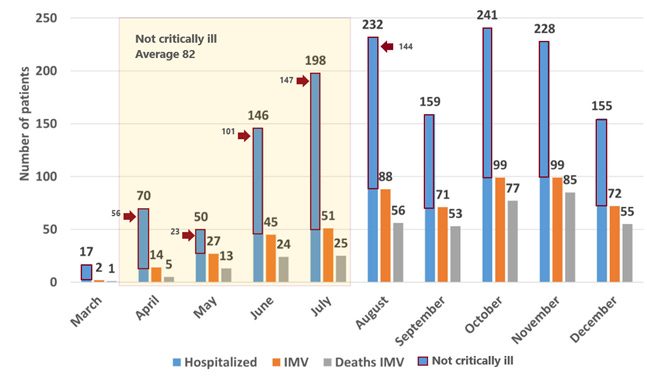More about Ivermectin. Is this study a fraud?
Inconsistencies from a prominent Mexican study that deserve an explanation.
Gonzalez et al., is a study published as a pre-print, which was the backbone in Cochrane review conclusions. It is a Mexican study conducted in the Centenario Hospital Miguel Hidalgo (CHMH) in Aguascalientes. The authors concluded that in non-critical hospitalized patients with COVID-19 pneumonia, ivermectin didn’t decrease the number of in-hospital days, respiratory deterioration, or deaths.
After several requests to the authors, they didn’t disclose the dataset. I also approached the researcher M.K. Gideon, who has the dataset, but he rejected to share it or to answer questions about it. His analysis didn’t detect a single reason to distrust the study. Which it is concerning, because even without the dataset, there are noticeable inconsistencies.
Inconsistency 1: The early stop
The study planned to enroll of 200 patients, but the authors stopped it with 108. The explanation was the following:
“During the past month of August, we observed a very significant decrease in the number of potential candidates that could be included in the study, since practically all hospital admissions required therapy with high oxygen concentrations or invasive mechanical ventilation. Based on the Ethics Committee´s recommendations, we decided to end recruitment and conduct an analysis with the data obtained as of August 15, 2020.”
The statement appears incorrect because in a second study from the same authors; they show that the number of critically ill patients in August 2020 differed little from July 2020, and it was more numerous than prior months. The study shows that there were 144 non-critically ill patients in August 2020, and only 82 as average in the previous four months.

Inconsistency 2: Change in hospital protocol
A second study revealed a changed the hospital treatment protocol by removing ivermectin from it on August 16, 2020. [i] The reason to remove ivermectin was the study ended a day before. An abrupt termination, the analysis in record time and the decision to remove ivermectin from the hospital protocol on the next day raises a lot of question. Especially because, since July 2020, the Ministry of Health was discouraging the use of ivermectin. And the CHMH director receives orders directly from the Ministry of Health.
In a third study, the authors wrote: “We performed an intermediate analysis in August 2020, that proved the therapeutic futility of ivermectin and HCQ, so their administration was withdrawn in protocol patients.” This is an additional contradiction because, based on the ivermectin study, the analysis in August wasn’t intermediate, as it derived from not having patients.
Inconsistency 3: Unexpected late deterioration in ivermectin arm.
Back to ivermectin study, the main graph shows an unusual pattern. Before day ten, the data seems legit. The IVM arm showed the lower deterioration, closely followed by HCQ and the placebo distant as third. Suddenly, after day 12, IVM arm tripled the number of patients with deterioration or death. This is an extremely rare and dubious set of events. The actual dataset could help to corroborate the study's cleanliness or adulteration.
Inconsistency 4: The real effect of ivermectin
In the second study, the authors try to make sense to the increase in mortality rate after removing ivermectin from the hospital protocol. After ruling out all factors but ivermectin, the authors conclude:
“In-hospital mortality in critically ill COVID-19 patients has increased in our center. The appropriate use of antibiotics, the type of sedation, and AKIN3 are modifiable factors directly related to this increased mortality. The increase in mortality observed in the second trimester is explained by hospital overcrowding that began in August 2020”
The authors didn’t provide evidence of hospital overcrowding. They mentioned a momentary excess in ICU capacity in August. The evidence certainly does not explain a 68% increase in the rate of mortality in two consecutive three-month periods. The mortality rate in critically ill patients that increased 68%, it went from 32% to 54%.

Conclusion
Even though the study is as a pre-print, WHO and Cochrane reviewed the data and use it in their peer-review publications. The authors’ conclusions altered the hospital treatment protocol, and the results are the backbone in the most recent Cochrane paper. Contradictions about early termination reasons, the rush to change the treatment protocol, the unexpected late deterioration in ivermectin arm, and the large increase in mortality rate after removing ivermectin are very concerning elements that need an explanation. These facts raise doubts the authors must clarify, and the Mexican authorities should investigate.
Ivermectin study.https://www.medrxiv.org/content/10.1101/2021.02.18.21252037v1
Second study. https://www.medrxiv.org/content/10.1101/2021.03.04.21252084v1
Third study. https://www.medrxiv.org/content/10.1101/2021.03.28.21254507v1



I do wonder if Gideon is shill.
My entire family suffered through covid these past two weeks. With the help of early treatment Ivermectin according to the FLCCC protocol we recovered from all major symptoms in ONE DAY. If this were a drug Pfizer or Merck was pushing it would be all over the news and any trials stopped immediately to begin mass distribution.
I assume the next study that will be attacked by critics is the massive Brazilian study of 220,517 subjects. 68% reduction in COVID-19 mortality’ for those using ivermectin and a 67% reduction in hospitalizations.
https://www.lifesitenews.com/news/twitter-suppresses-massive-study-showing-ivermectin-reducing-covid-mortality-by-68/